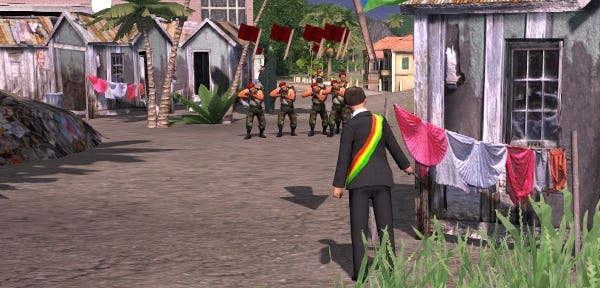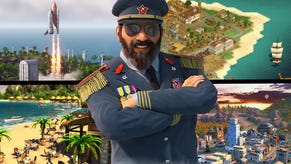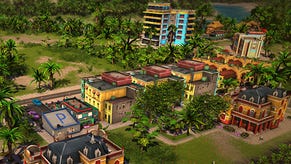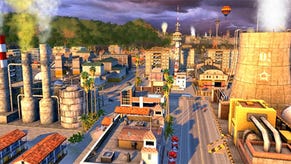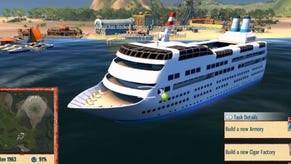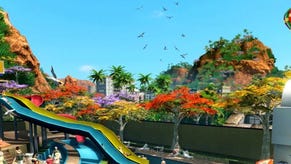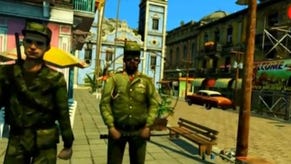Wot I Think: Tropico 4
First Against The Wall
To my great disappointment, I am a benevolent dictator. The people of Tropico 4's do not fear the tread of the jackboot, but are instead smothered under the heavy yoke of first-rate entertainment options and lucrative employment opportunities. Even the communists and intellectuals have been yielded to the bourgeois hellscape I have created. There will be no revolution to televise.
Which is a bit of shame. Tropico 4 arrives after a year of political discontent exploding into burning barricades and gusts of tear gas, and it would have been fascinating if Tropico 4 fully explored its Cold War-era, dictatorial theme. The whole game carries the threat of political violence: the militarists demand more soldiers and guard posts, loyalists beg you to mobilize the secret police and cancel elections, and by twos and threes discontented citizens turn to crime or join the rebels in the hills. But Tropico is a city-builder, and the answer to most problems is not a vicious crackdown but a new round of zoning. In my fourteen hours with the game, I have never had to steal an election or declare martial law. The interests I balance interlock too conveniently, which means most of the fun "dictatorial" gameplay options are only useful in cases of incompetence or pure malice.

For instance, glancing at the faction relations table shows me that the communists want a social safety net and better healthcare, but those are both expensive services to offer. Fortunately, a little business investment increases prosperity so much that social services are fiscally painless, and now the communists and capitalists are both delighted with me. Perhaps the environmentalists are angry over the rise of industry, but I can mollify them with parks and anti-pollution ordinances. Now living quality is on the rise, and the environmentalists are happy as well. It's win-win-win. In Tropico 4, there seems to be no limit to the number of ways you can split the baby.
That's not to say Tropico 4 is too easy. The campaign difficulty steadily increases, and some islands are quite challenging. It's hard to make everybody happy when your economy depends on scattered strip mines and clear-cut logging camps, and a dip in commodity prices can be deadly. Throw in a costly natural disaster or political event, and suddenly there is no easy way to progress. Rather than building upscale condos and entertainment options, El Presidente must instead tamp down crime and unrest in the tenements and shantytowns that crouch near the sweat shops. This is just the type of downward spiral that forced me to murder my dockworkers.
The docks are the island's lifeline. They bring in the immigrants who grow the economy, the imports that fuel and feed it, and the exports that sustain it. So when my underpaid longshoremen went on strike, my already shaky economy started to look terminal.

Their demands were entirely reasonable, and a little bit of money would have made the entire problem go away, but I didn't have any money. My foray into the tourist trade had been an unmitigated disaster, and all my funds were tied up in an empty luxury hotel and cheap bungalows. I was clinging to life thanks to my struggling rum factories, and a handful of justly-aggrieved dockworkers were about to destroy those, too. Since I couldn't buy them off, I did the next best thing: I shot them dead in front of dozens of onlookers.
The docks reopened (at reduced staff), and the surge in exports brought a brief recovery. With a little more time, everything could have been put right. The Communists, however, denied me that time. After I killed the strikers, they headed to the hills and started a major insurrection. Revolutionaries from around the world came to join them, and the USSR stopped providing subsidies. My army survived a couple rebel raids, but they sustained heavy casualties and I had trouble replacing them. There were few volunteers for my bloody civil war, and I started losing control of the island. Eventually the war arrived at the beaches as my policemen, the remnants of my army, and the guerrillas battled it out in the streets.

This was all as vivid as it sounds. Tropico 4 is a lovely and lovingly detailed game that rewards your efforts with attractive and informative visuals. The strikers carry little signs and gather motley crowds to them. I watched the rebels steal through the slums and then converge on the police station. Traffic on the road leading to the beach came to a dead stop, and drivers sent their cars into panicked U-turns and raced back home. As the fighting intensified, a policeman took cover in a crowded beachfront restaurant. A varicolored mob of tourists headed for the ships like D-Day in reverse, wearing uniforms of Hawaiian shirts and boat hats.
These visuals, and what they tell you about conditions on the island, make Tropico a consistent pleasure, whether or not things are going well. There is joy in building my banana republic, and I have fiddled with the controls to get just the right combination of fountains and gardens in front of my ministry. For tourists I construct false realities: white, sandy beaches bestrewn with cabanas and luxury villas. Just over the hills are the coal-powered generators that light their hotel rooms and the tenement slums where their maids live, but it's critical the tourists never see that. That's the sort of thing that turns a novelty-sized margarita into a fishbowl of tragedy topped by a pink umbrella of first-world shame.

Tropico 4 does not seem particularly challenging, and ultimately I feel like I am learning proper procedures rather than making hard choices. I had to fight a communist revolution because I did not know how to develop a tourist industry, and I never again faced such a serious challenge to governance. I fear there is one way to play, and the trick is adapting it to every combination of resources and conditions, and already I have started to follow some rote procedures.
Yet I am not bored by them, because it is fun to govern and build. It is satisfying to read the thoughts of a cook at a beachside resort, seeing how much better he feels about life now that he has a garage near his house, a movie theater where he can relax, and a cathedral up the street. Tropico 4 might be too gentle to satisfy budding authoritarians, but it more than compensates the urban planners and aesthetes among us. The trappings of dictatorial power and Cold War rivalry merely serve to make a good city-builder more interesting, but I can't help but wish Tropico's theme were more than decoration. As it is, Tropico 4 is the kind of theme park it has you build for tourists. The illusion wears thin after awhile, but it's a nice vacation spot.
